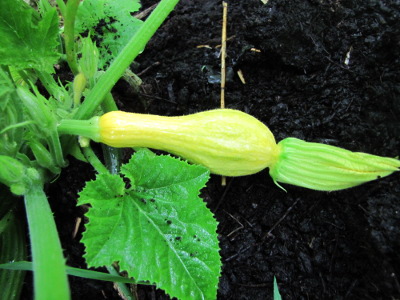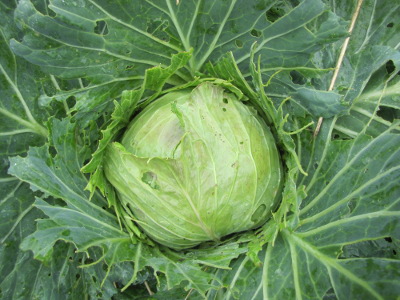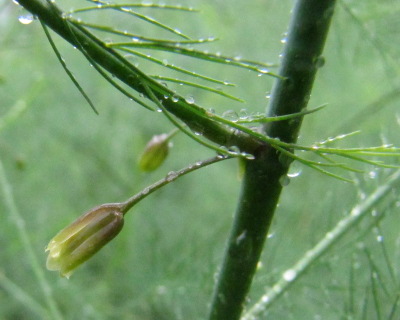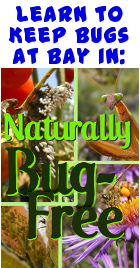
Organic insect control
 Bad bugs are a fact of life on the
organic farm. My favorite method of insect control is avoidance,
which is our new technique for combatting the squash
vine borer this
year. We love summer squash, but the yellow zucchini varieties
we'd been growing were magnets for the borer. After reading that
vine borers tend to skip yellow crookneck plantings, we decided to give
this new variety a shot, and sure enough, I saw the vine borers pass
through the garden but only found one damaged stem and none of the
squash plants wilted. The only downside is that I'd planned for
our summer squash to die young like it does every other year, so I succession
planted --- we may
soon be swimming in summer squash.
Bad bugs are a fact of life on the
organic farm. My favorite method of insect control is avoidance,
which is our new technique for combatting the squash
vine borer this
year. We love summer squash, but the yellow zucchini varieties
we'd been growing were magnets for the borer. After reading that
vine borers tend to skip yellow crookneck plantings, we decided to give
this new variety a shot, and sure enough, I saw the vine borers pass
through the garden but only found one damaged stem and none of the
squash plants wilted. The only downside is that I'd planned for
our summer squash to die young like it does every other year, so I succession
planted --- we may
soon be swimming in summer squash.
 You can avoid insects with
timing as well as with variety selection. Most years, I manage to
get the broccoli in the ground early enough that I've got all of the
heads processed by the time the cabbage whites start fluttering through
the garden to lay their eggs, so I barely have to deal with cabbage worms. This year, the spring
ground was so cold that my broccoli and cabbage ran a week late, and we
ended up with lots of damage. I've resolved that if the soil
temperature is too low to plant my spring crucifers on time next year,
I'll start them indoors so that I can avoid those pesky caterpillars.
You can avoid insects with
timing as well as with variety selection. Most years, I manage to
get the broccoli in the ground early enough that I've got all of the
heads processed by the time the cabbage whites start fluttering through
the garden to lay their eggs, so I barely have to deal with cabbage worms. This year, the spring
ground was so cold that my broccoli and cabbage ran a week late, and we
ended up with lots of damage. I've resolved that if the soil
temperature is too low to plant my spring crucifers on time next year,
I'll start them indoors so that I can avoid those pesky caterpillars.
If I can't avoid them,
my next line of defense is hand-picking. Just fill a cup
with water and flick or drop the insects in --- they'll be too busy
staying afloat to fly away. If you're picking chicken-approved
insects (everything except asparagus beetles and stinkbugs in our
garden), pour the contents of the bug cup into the pasture and your
insects will quickly be converted into eggs. If your chickens
won't eat them, you can always just put a lid on the picking container
and let the bad bugs drown.
 The new trick I've discovered
this year about hand-picking is to hit the insects hard as soon as they
appear. In 2010, I dutifully squashed asparagus beetles once a
week, but there always seemed to be more to pluck. This year,
when the first beetles arrived, I picked them immediately and kept
checking on the plants at least once a day until I no longer saw
adults. Then I squashed the few larvae that got past my first
round of control three times a week until they were also gone. By
the time the asparagus ferns were fully leafed out and impossible to
check for bugs, the asparagus beetle had been eradicated! Even
though it felt like I was spending more time picking bugs than in
previous years, I was able to stop after just a few weeks, so my total
bug-picking hours for the year were actually fewer.
The new trick I've discovered
this year about hand-picking is to hit the insects hard as soon as they
appear. In 2010, I dutifully squashed asparagus beetles once a
week, but there always seemed to be more to pluck. This year,
when the first beetles arrived, I picked them immediately and kept
checking on the plants at least once a day until I no longer saw
adults. Then I squashed the few larvae that got past my first
round of control three times a week until they were also gone. By
the time the asparagus ferns were fully leafed out and impossible to
check for bugs, the asparagus beetle had been eradicated! Even
though it felt like I was spending more time picking bugs than in
previous years, I was able to stop after just a few weeks, so my total
bug-picking hours for the year were actually fewer.
In the end, most of my
insect control methods come down to timing, which is why I'm careful to
mark emergence dates on my calendar and cruise past problem plants
daily when insects are due to arrive. In a temperate climate,
winter does a remarkably good job of knocking insect populations back;
 my job is just to follow along in the footsteps of cold weather
and make sure the insects stay down. Yet another reason I'm glad
I don't live in the tropics.
my job is just to follow along in the footsteps of cold weather
and make sure the insects stay down. Yet another reason I'm glad
I don't live in the tropics.
Want more in-depth information? Browse through our books.
Or explore more posts by date or by subject.
About us: Anna Hess and Mark Hamilton spent over a decade living self-sufficiently in the mountains of Virginia before moving north to start over from scratch in the foothills of Ohio. They've experimented with permaculture, no-till gardening, trailersteading, home-based microbusinesses and much more, writing about their adventures in both blogs and books.
Want to be notified when new comments are posted on this page? Click on the RSS button after you add a comment to subscribe to the comment feed, or simply check the box beside "email replies to me" while writing your comment.

I could be wrong, but I doubt you've got the vine borer in your cucumbers. They generally leave cucumbers and melons alone because the stems of these plants are more solid and harder to deal with.
What's more likely is a fungus or virus --- we generally lose our cucumbers in short order to mildews. Has it been wet where you live? I try to plant my cucumbers in a very sunny spot so they dry off quickly after a rain, and I put new seeds in the ground every two weeks until mid summer so that I can keep harvesting even when the old plants die off. Some folks spray the leaves with milk or other substances, but succession planting and using resistant varieties has been the most helpful for me.